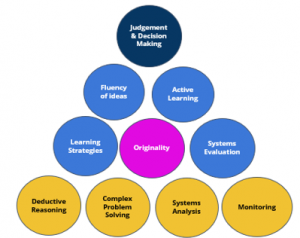
The biggest change since the Industrial Revolution is unfolding in the global industrial sector. To equip themselves for this new world, today’s learners are realising that in order to stay in the race for employment, they must grow, demonstrate and evolve their talents. Educationalists acknowledge that, to help them do this, education systems across the world must evolve rapidly to support them.
Addressing the skills gap
There is also a rise in well-founded concerns about the “skills gap” – that is the gap between the knowledge and skills young people leave education with and those they really need in the 21st century workplace. At the World Economic Forum, in 2018, Jack Ma, the founder of successful Chinese e-commerce company, Alibaba, stated that“If we do not change the way we teach, 30 years from now, we’re going to be in trouble. The knowledge-based approach of 200 years ago will fail our kids. Children should be taught soft skills like independent thinking, values and team-work.”
Building learners’ soft skills
To address this skills gap, learners need soft skills. Vocational education and training is not just about developing the job-specific and technical skills a learner might need for a job that already exists, it also provides learners with opportunities to develop other, more general skills to help them adapt to future jobs and needs.
Every high-quality vocational education and training programme is now, and increasingly, underpinned by these skills, which make up the top 10 required skills outlined in research commissioned by Pearson.
Increasing demand for TVET globally
Focusing on technical and vocational education and training (TVET) on a global scale, it is clear that there is increasing demand around the world for such education. It’s not just a priority for individual governments, but for international institutions as well, such as the World Economic Forum.
Research shows that 65% of children aged 12 in 2018 will find employment in jobs which, today, don’t yet exist. What skills might the future-day worker – perhaps a drone operator or a monetised Instagrammer – have learned when they were at school?
Equipping all students for success
With this increasing demand and need for a varied education offer in schools, colleges and businesses, the key question is how can senior international school leaders equip all your students for success? What role do vocational qualifications play alongside academic qualifications in a broad and balanced curriculum to give learners of all levels and ages the employability skills they need, whether they progress on to higher education or straight into work?
International BTECs are offered in 14 different subject areas ranging from Applied Science through to Esports. There is even a Sport qualification which is partnered and endorsed by Liverpool Football Club.
International BTECs can be used as an education pathway on their own, alongside academic qualifications such as International A levels or they can form part of the IBCP (International Baccalaureate Career-related Programme).
The idea is to provide students with a world-class, career-ready qualification by teaching them skills which match their ambition.
Join The Big Think
For a deeper discussion of the role vocational education can play alongside academic and IB pathways in international schools, catch up on demand with our free webinar, recorded on 19 January as part of The Big Think series of webinars for school leaders. Read more about the series and how to register for similar on our website.



